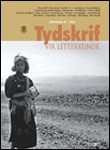Om ruim in Afrika te leef
DOI :
https://doi.org/10.4314/tvl.v40i1.53612Mots-clés :
Afrikaanse letterkunde, Afrikaanse taalgemeenskapRésumé
This article is a revised version of an inaugural lecture delivered at the University of Pretoria on 19 July 2001. The paper considers the future of Departments of Afrikaans following the end of Afrikaner political rule. It is divided into three subsections: a overview of the close affiliation between the Afrikaans language, literature and Afrikaner nationalism, as well as the practice of Afrikaans literary criticism; reactions from the Afrikaans speaking community to the demise of Afrikaner political rule and lastly, tentative proposals for the continued development of Departments of Afrikaans. The association between Afrikaans and Afrikaner nationalism became so ingrained that discursively, the language became the exclusive domain of the Afrikaners. The democratisation of 1994 brought about change and weakened the bond between Afrikaner nationalism and the Afrikaans language. Responses to the new dispensation vary. One such response is an attempt at redefining Afrikaner identity, encompassing those whose roles in the formation of the Afrikaans language were previously undervalued (such as black, principally coloured, Afrikaans speakers). Other responses support an overarching South African identity. These public debates have corollaries in the debates on Afrikaans literature. The author argues that conscious steps must be undertaken to actively develop links with other African, southern and South African literatures; while at the same time institutionalised literary models, approaches and the demands of contemporarycultural practices must be re-evaluated.
Téléchargements
Téléchargements
Publiée
Numéro
Rubrique
Licence
(c) Copyright Tydskrif vir Letterkunde 2003

Ce travail est disponible sous licence Creative Commons Attribution - Partage dans les Mêmes Conditions 4.0 International.


 https://orcid.org/0000-0001-6465-6584
https://orcid.org/0000-0001-6465-6584


.png)